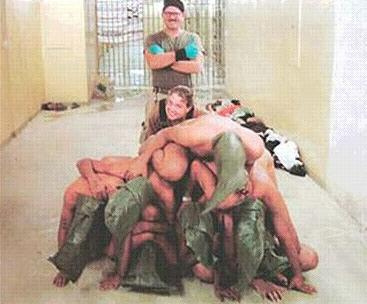Psychologists’ Collusion in Ongoing Illegal Detentions
As we commemorate the 10th anniversary of the arrival of the first prisoners at Guantánamo Detention Center, several thousand miles away sits another United States detention facility, less well-known but with a history perhaps even more gruesome. Obscured throughout the decade-long “global war on terror,” the detention center at Bagram Air Force Base in Afghanistan is where two detainees died in December 2002. Initial autopsies at the time ruled both deaths homicides, according to a 2,000-page confidential Army file obtained by the New York Times. Autopsies of the two dead detainees found severe trauma to both prisoners’ legs. The coroner for one of the dead noted, “I’ve seen similar injuries in an individual run over by a bus.” In January 2009, to much fanfare, newly-elected President Barack Obama signed a directive authorizing the closing of Guantánamo Detention Center. But a month later the new administration discreetly told a federal judge that military detainees at Bagram had no habeas corpus rights to challenge their imprisonment. At the same time, the Pentagon was moving forward on plans to build a new prison in Bagram, renamed the “Detention Facility in Parwan” (DFIP). This facility was designed to accommodate 600 prisoners under normal conditions and as many as 1,100 during a “surge.” Today, President Obama has abandoned his inaugural pledge to close Guantánamo and there are more than 3,000 detainees at Bagram — five times the number of prisoners when the president took office — with a scheduled expansion of the facility by the end of 2012 to house up to 5,500 detainees. One troubling constant across the developments at Bagram is the presence and involvement of psychologists at these facilities, which clearly violate international legal standards for the treatment of detainees. Among the military psychologists present during the early years of the Bagram prison were Colonel Morgan Banks, Captain Bryce Lefever, and Colonel Larry James, notable for their key roles in formulating American Psychological Association (APA) much-criticized ethics policy on psychologist-assisted interrogations. According to Banks’ biographical statement, he “spent four months over the winter of 2001/2002 at Bagram Airfield.” More broadly, Banks provided technical, consultation, and interrogation support to all Army psychologists. He also assisted in establishing the Army’s first permanent SERE training program. As for Lefever’s biosketch, it notes that he also served at the detention center at Bagram Air Base. He “was deployed as the Joint Special Forces Task Force psychologist to Afghanistan in 2002, where he lectured to interrogators and was consulted on various interrogation techniques.” The third military psychologist, James, was the Chief Psychologist for the Joint Intelligence Group at Guantánamo when, according to his book, Fixing Hell, he flew to Afghanistan to transfer three juveniles who had been forcibly and arbitrarily detained at Bagram. James described these boys as “the most fragile . . . children [he] had ever met,” yet he oversaw their being loaded onto a cargo plane at Bagram Air Force Base, “bound [and] blindfolded,” for a flight that typically lasted over 20 hours. Others who appear to have been transferred from Bagram to Guantánamo that same day reported being chained around the waist, wrists, back and ankles and the intense pain of being unable to speak, see, hear, move, or even stretch or breathe properly. The boys were essentially kidnapped, and were returned home a year later, having never had access to legal counsel and having never been charged with a crime. Public information about exactly what transpires at Bagram today is scarce. The BBC was allowed a rare, one-hour visit to the new Parwan/Bagram prison in 2010. The report noted that “Prisoners are kept in 56 cells, which the prisoners refer to as ‘cages’. The front of the cells are made of mesh, the ceiling is clear, and the other three walls are solid. Guards can see down into the cells from above.” These detainees were moved around in wheelchairs, wearing goggles and headphones to block sight and sound. In 2011, Daphne Eviatar, an attorney for Human Rights First, interviewed 18 former detainees from the main facility in Parwan and was permitted to observe seven detainee hearings there. In her detailed report she noted: After many years of completely denying detainees in Afghanistan the opportunity to defend themselves against arbitrary detention, the United States government has finally implemented a hearing process that allows detainees to hear the charges against them and to make a statement in their own defense. Although a significant improvement, these new hearings fall short of minimum standards of due process required by international law.” [Emphasis added.] In a subsequent interview with CBS News, Eviatar stated: [Parwan] is worse than Guantánamo because there are fewer rights…There was no evidence presented, there was no questioning of the government’s evidence, whether this person had done anything wrong, whether he deserved to be in prison. So that’s a real problem — you have a complete lack of due process. And in 2010 the International Committee of the Red Cross (ICRC) confirmed the existence of a separate, second detention facility at Parwan. Many former prisoners have referred to it as the Tor Jail, translated as “Black Jail.” Nine former prisoners interviewed separately by the BBC spoke of almost identical treatment there: distressingly cold cells, perpetual loud noise, constant light, and, violating any sense of privacy, camera surveillance. One former prisoner said American soldiers made him dance to music to obtain permission to use the toilet. Today, there are clear indications that psychologists continue to be involved in the detention and interrogation of detainees at Parwan/Bagram. Such activities stand in direct contravention of APA policy based on a 2008 petition resolution. Approved through a member-led referendum, this resolution prohibits psychologists from working in settings where “persons are held outside of, or in violation of, either International Law (e.g., the UN Convention Against Torture and the Geneva Conventions) or the US Constitution (where appropriate), unless they are working directly for the persons being detained or for an independent third party working to protect human rights” (or if they are providing treatment for military personnel). Significant evidence that psychologists are working at Bagram/Parwan in violation of APA policy comes in part from a symposium on “Operational Problems in Behavioral Sciences” sponsored by the United States Air Force Medical Service in August 2011. The first slide of the partially redacted powerpoint presentation on the “BSCT Mission” describes the role of the Behavioral Science Consultation Team (BSCT) as providing: “…psychological expertise and consultation in order to assist the command in conducting safe, legal, ethical, and effective detention facility operations, intelligence interrogations, and detainee debriefing operations” (OTSG/MEDCOM Policy Memo 09-053). A later slide reveals that the current BSCTs at the Parwan Detention Facility are composed of a psychologist or forensic psychiatrist, who must be licensed for independent practice, and a “behavioral science technician.” Further confirming the presence of psychologists, a June 2010 newspaper article about Parwan by the military editor of the Fayettville Observer notes: “Air Force Maj. Colin Burchfield, 34, a clinical psychologist, observes the behavior of both detainees and guards on TV monitors.” Disturbingly, and contrary to the APA’s 2008 referendum policy, one of the key documents still used to support the ongoing involvement of psychologists at the Parwan facility is an earlier 2005 report from the APA’s “Presidential Task Force on Psychological Ethics and National Security” (the PENS Report). The PENS Report, cited in the Operational Problems powerpoint presentation described above, endorsed psychologists’ engagement in detainee interrogations — despite evidence that psychologists were involved in abusive interrogations and practices that violate international law. Six of the nine voting members of the PENS Task Force were on the payroll of the U.S. military and/or intelligence agencies. Five of these six served in chains of command that had been accused of the kinds of abuses that led to the creation of the Task Force, including the three psychologists linked to the early Bagram prison: Dr. Morgan Banks, Dr. Bryce Lefever, and Dr. Larry James. The PENS Task Force concluded that psychologists have an important role to play in keeping interrogations “safe, legal, ethical, and effective,” and the APA Board approved the PENS Report in a highly unusual emergency vote. The APA’s claims that it stands strongly against torture and cruel, inhuman and degrading treatment are belied by the organization’s repeated failure to take assertive and meaningful action. There is no clearer example than the continuing participation of psychologists in detention and interrogation activities at the Parwan/Bagram prison — a site where international law itself is seemingly confined indefinitely to a small, dark cell. But health professionals, human rights advocates, and intelligence professionals of conscience worldwide have refused to accept this status quo. One noteworthy and promising effort is an online petition campaign calling for the annulment of APA’s PENS Report. The initiative has been supported by many distinguished members of APA, as well as non-psychologists such as psychiatrists Robert Jay Lifton and bioethicist Dr. Steven Miles; scholar-activists such as Daniel Ellsberg and Noam Chomsky; attorneys who have represented Guantanamo detainees; eminent veterans of the intelligence community; and many other psychologists and human rights advocates. Please consider joining this call and signing the petition at www.ethicalpsychology.org/pens. Trudy Bond is an independent psychologist, steering committe member of Psycholgoists for Social Responsibility, and a member of the Coalition for an Ethical Psychology. For questions, responses or media contact, please contact her at drtrudybond@gmail.com. Roy Eidelson is a clinical psychologist and the president of Eidelson Consulting, where he studies, writes about, and consults on the role of psychological issues in political, organizational, and group conflict settings. He is a past president of Psychologists for Social Responsibility, associate director of the Solomon Asch Center for Study of Ethnopolitical Conflict at Bryn Mawr College, and a member of the Coalition for an Ethical Psychology. Roy can be reached at reidelson@eidelsonconsulting.com. Brad Olson is an assistant professor and co-director of the Community Psychology Ph.D. Program in downtown Chicago. He is President-Elect of Psychologists for Social Responsibility (PsySR) and co-founder of the Coalition for an Ethical Psychology. Stephen Soldz is a psychoanalyst, psychologist, public health researcher, and faculty member at the Boston Graduate School of Psychoanalysis. He edits the Psyche, Science, and Society blog. Soldz is a founder of the Coalition for an Ethical Psychology and served as a psychological consultant on several Guantánamo trials. Currently Soldz is Past-President of Psychologists for Social Responsibility [PsySR].





